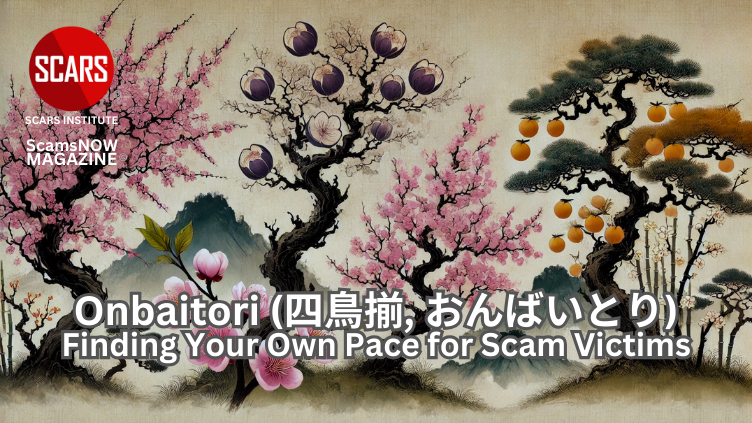Jōhatsu 蒸発 – When Japanese Scam Victims Disappear
Vanishing in Shame: How Scam Victims in Japan Become Johatsu – Disappearing as a Coping Mechanism
Primary Category: Scam Victim Recovery Psychology
Intended Audience: Scam Victims-Survivors / Family & Friends
Author:
• Tim McGuinness, Ph.D., DFin, MCPO, MAnth – Anthropologist, Scientist, Polymath, Director of the Society of Citizens Against Relationship Scams Inc.
About This Article
In Japan, the phenomenon of johatsu, or “evaporated people,” refers to individuals who deliberately vanish from their lives to escape shame, financial ruin, or social stigma. While johatsu has traditionally been associated with those fleeing debt, failed relationships, or workplace stress, a growing number of scam victims—those who have lost their life savings to fraud—are also choosing to disappear.
The overwhelming guilt, humiliation, and fear of judgment drive some scam victims to sever all ties, leaving behind their families and identities to start over in anonymity. Many utilize yonige services, professional companies that assist with secret overnight moves, untraceable housing, and methods to erase their digital footprints.
While some victims manage to rebuild their lives in secrecy, others find themselves trapped in poverty or isolation, unable to recover from their losses. The rise of scam victims turning to johatsu highlights the deep cultural pressures surrounding financial failure in Japan, where the shame of being deceived can feel worse than the loss itself.

Vanishing in Shame: How Scam Victims in Japan Become Johatsu – Disappearing as a Coping Mechanism
Jōhatsu (Japanese: 蒸発, Meabs “evaporation”) or Jouhatsu refers to people in Japan who purposely vanish from their established lives without a trace.
In Japan, the phenomenon of johatsu—literally meaning “evaporated people”—refers to individuals who disappear without a trace, leaving behind their past lives to escape personal shame, financial ruin, or social pressure. While this silent exodus has long been associated with those fleeing debt, failed relationships, or workplace stress, another group has increasingly been vanishing into the shadows: scam victims.
For those who have lost their life savings to fraud—whether through investment scams, romance fraud, or financial manipulation—the crushing weight of shame, debt, and social judgment can feel unbearable. In a society that places a high value on personal responsibility and saving face, many victims struggle to confront the reality of their losses. Instead of facing the stigma of being deceived, some choose to disappear entirely, severing all ties and starting over in anonymity.
This article explores how scam victims in Japan turn to johatsu as an escape, the psychological and financial pressures that drive them to vanish, and what happens to those who choose to erase their identities rather than live with the consequences of fraud. Understanding this hidden crisis sheds light on the profound impact of financial loss, social expectations, and personal identity in Japanese society.
Understanding Johatsu
Johatsu (蒸発) in Japan refers to “evaporated people,” a term used to describe individuals who deliberately disappear from their lives without leaving a trace. The word johatsu literally means “evaporation”, symbolizing how these people vanish from society, often without any official records of their whereabouts.
Why Do People Become Johatsu?
People choose to disappear for various personal and societal reasons, often linked to shame, debt, family pressure, or personal crises. Common reasons include:
Debt and Financial Ruin – Those burdened by unpayable debts, bankruptcy, or failed businesses may disappear to escape creditors, loan sharks, or financial shame.
Shame and Social Stigma – Japanese society places a high value on honor and reputation. People who fail in relationships, jobs, or social obligations may choose to vanish rather than face public disgrace.
Abusive Relationships and Domestic Violence – Some Johatsu are individuals fleeing abusive spouses, toxic families, or controlling social structures.
Divorce or Relationship Breakdowns – After messy divorces or extramarital affairs, some individuals disappear to avoid confrontation or custody battles.
Workplace Stress and Karoshi (Death from Overwork) – Japan’s intense work culture causes some people to abandon their jobs and lives due to burnout or corporate failures.
Criminal Activity or Legal Issues – Some Johatsu flee to avoid law enforcement, lawsuits, or association with crime.
How Do People Disappear?
Many Johatsu use “night-moving” services (夜逃げ, yonige)—companies that specialize in helping people secretly move away overnight. These businesses assist in:
-
-
- Relocating people without leaving a trace.
- Finding cash-only or under-the-radar housing.
- Avoiding digital tracking through cell phones and social security systems.
-
Disappearing is easier in Japan due to loopholes in legal systems, lack of centralized tracking, and cultural reluctance to interfere in personal matters.
Where Do the Johatsu Go?
The Johatsu often relocate to remote rural towns, low-cost city neighborhoods, or underground communities where no one asks questions. Some take on cash-paying jobs in areas like construction, fishing, or night entertainment to remain undetected.
Can They Be Found?
Families of the Johatsu sometimes hire private detectives to track them down, but success rates vary. Japanese laws also protect the privacy of missing adults, meaning police do not always intervene unless a crime is suspected.
Cultural Significance
Johatsu represents an unspoken social phenomenon in Japan—where people “disappear” rather than confront shame, failure, or personal suffering. The phenomenon reflects the pressures of Japanese society and its strict social norms, which sometimes make disappearing seem easier than facing the consequences.
When Scam Victims Go Johatsu
Scam victims in Japan sometimes become Johatsu to escape the intense shame, financial ruin, and social stigma associated with being deceived. In effect, it is a coping mechanism to help them deal with overwhelming shame.
In a society that places a strong emphasis on personal responsibility, honor, and social standing, many victims of fraud—especially those who lose their life savings—find it extremely difficult to face family, friends, and society after being scammed.
Why Would Scam Victims Choose Johatsu?
Victims of fraud, particularly elderly individuals, business owners, or those scammed out of significant amounts of money, may disappear for the following reasons:
Shame and Social Disgrace
-
-
-
- In Japan, there is a strong cultural expectation to be financially responsible. Victims of scams, especially financial fraud or romance scams, often feel humiliated for being “naïve” or “careless.”
- This shame can be even worse for professionals (such as business executives, retirees, or government workers) who fear public embarrassment if others find out they were deceived.
-
-
Debt and Financial Ruin
-
-
-
- Many scam victims lose everything, falling into massive debt they cannot repay.
- Some turn to loan sharks or predatory lenders, making their situation worse. To escape debt collectors or the pressure of repaying family and friends, they may vanish overnight.
-
-
Fear of Family and Social Judgment
-
-
-
- Japanese culture values saving face, and some scam victims worry that their families will see them as foolish, irresponsible, or a burden.
- In extreme cases, victims may even feel that disappearing is more honorable than living with disgrace.
-
-
Psychological Trauma and Emotional Distress
-
-
-
- Scam victims can suffer from depression, PTSD, or suicidal thoughts, leading them to seek a complete break from their old lives.
- Disappearing may feel like the only escape from overwhelming guilt, stress, and anxiety.
-
-
Avoiding Authorities or Aggressive Collectors
-
-
-
- Some victims, especially those caught in investment scams or pyramid schemes, may have unknowingly recruited others into the scam. If they lose everything, they might fear legal consequences or retaliation from those they involved.
- Victims who borrowed from underground lenders or yakuza-connected financial schemes may disappear to avoid violent debt collection.
-
-
How Do Scam Victims Disappear?
Many scam victims use yonige services (夜逃げ, “night-moving” services), companies that specialize in helping people vanish without a trace. These services assist with:
-
-
- Secret overnight moves to a remote town or low-cost city district.
- Finding cash-only apartments that require no formal identification.
- Teaching clients how to erase digital footprints (e.g., discarding phones, changing names, avoiding banks).
-
Some victims also move to underground or off-the-grid jobs, such as:
-
-
- Manual labor in rural construction sites.
- Dishwashing or janitorial work at low-profile businesses.
- Hostess clubs or night entertainment industries (for younger victims).
-
Do Families Ever Find Scam Victims Who Have Disappeared?
Families sometimes hire private investigators to track down missing loved ones, but finding a johatsu is extremely difficult.
-
-
- Japanese law protects missing adults’ privacy, meaning police will not actively search unless a crime is suspected.
- Many johatsu live quietly in remote areas, avoiding official documents, digital banking, or public services.
-
What Happens to Scam Victims Who Disappear?
Some eventually rebuild their lives in anonymity, starting over with a new identity, a new job, and no contact with their past.
Others, especially those who never recover financially or emotionally, may end up living in extreme poverty, in homeless shelters or on the margins of society. This is not so different the world over.
Conclusion
Johatsu offers a tragic but culturally significant escape for scam victims in Japan who feel overwhelmed by shame, debt, or social pressure. Instead of facing the consequences of their financial ruin, they choose to erase their past and start over in anonymity. This reflects the deep-rooted cultural pressures around financial failure and honor in Japan, making it more difficult for scam victims to come forward, seek help, or recover socially after their losses.
-/ 30 /-
What do you think about this?
Please share your thoughts in a comment below!
Statement About Victim Blaming
SCARS Institute articles examine different aspects of the scam victim experience, as well as those who may have been secondary victims. This work focuses on understanding victimization through the science of victimology, including common psychological and behavioral responses. The purpose is to help victims and survivors understand why these crimes occurred, reduce shame and self-blame, strengthen recovery programs and victim opportunities, and lower the risk of future victimization.
At times, these discussions may sound uncomfortable, overwhelming, or may be mistaken for blame. They are not. Scam victims are never blamed. Our goal is to explain the mechanisms of deception and the human responses that scammers exploit, and the processes that occur after the scam ends, so victims can better understand what happened to them and why it felt convincing at the time, and what the path looks like going forward.
Articles that address the psychology, neurology, physiology, and other characteristics of scams and the victim experience recognize that all people share cognitive and emotional traits that can be manipulated under the right conditions. These characteristics are not flaws. They are normal human functions that criminals deliberately exploit. Victims typically have little awareness of these mechanisms while a scam is unfolding and a very limited ability to control them. Awareness often comes only after the harm has occurred.
By explaining these processes, these articles help victims make sense of their experiences, understand common post-scam reactions, and identify ways to protect themselves moving forward. This knowledge supports recovery by replacing confusion and self-blame with clarity, context, and self-compassion.
Additional educational material on these topics is available at ScamPsychology.org – ScamsNOW.com and other SCARS Institute websites.
-/ 30 /-
What do you think about this?
Please share your thoughts in a comment below!
One Comment
Leave A Comment
Important Information for New Scam Victims
- Please visit www.ScamVictimsSupport.org – a SCARS Website for New Scam Victims & Sextortion Victims.
- SCARS Institute now offers its free, safe, and private Scam Survivor’s Support Community at www.SCARScommunity.org – this is not on a social media platform, it is our own safe & secure platform created by the SCARS Institute especially for scam victims & survivors.
- SCARS Institute now offers a free recovery learning program at www.SCARSeducation.org.
- Please visit www.ScamPsychology.org – to more fully understand the psychological concepts involved in scams and scam victim recovery.
If you are looking for local trauma counselors, please visit counseling.AgainstScams.org
If you need to speak with someone now, you can dial 988 or find phone numbers for crisis hotlines all around the world here: www.opencounseling.com/suicide-hotlines
Statement About Victim Blaming
Some of our articles discuss various aspects of victims. This is both about better understanding victims (the science of victimology) and their behaviors and psychology. This helps us to educate victims/survivors about why these crimes happened and not to blame themselves, better develop recovery programs, and help victims avoid scams in the future. At times, this may sound like blaming the victim, but it does not blame scam victims; we are simply explaining the hows and whys of the experience victims have.
These articles, about the Psychology of Scams or Victim Psychology – meaning that all humans have psychological or cognitive characteristics in common that can either be exploited or work against us – help us all to understand the unique challenges victims face before, during, and after scams, fraud, or cybercrimes. These sometimes talk about some of the vulnerabilities the scammers exploit. Victims rarely have control of them or are even aware of them, until something like a scam happens, and then they can learn how their mind works and how to overcome these mechanisms.
Articles like these help victims and others understand these processes and how to help prevent them from being exploited again or to help them recover more easily by understanding their post-scam behaviors. Learn more about the Psychology of Scams at www.ScamPsychology.org
SCARS INSTITUTE RESOURCES:
If You Have Been Victimized By A Scam Or Cybercrime
♦ If you are a victim of scams, go to www.ScamVictimsSupport.org for real knowledge and help
♦ SCARS Institute now offers its free, safe, and private Scam Survivor’s Support Community at www.SCARScommunity.org/register – this is not on a social media platform, it is our own safe & secure platform created by the SCARS Institute especially for scam victims & survivors.
♦ Enroll in SCARS Scam Survivor’s School now at www.SCARSeducation.org
♦ To report criminals, visit https://reporting.AgainstScams.org – we will NEVER give your data to money recovery companies like some do!
♦ Follow us and find our podcasts, webinars, and helpful videos on YouTube: https://www.youtube.com/@RomancescamsNowcom
♦ Learn about the Psychology of Scams at www.ScamPsychology.org
♦ Dig deeper into the reality of scams, fraud, and cybercrime at www.ScamsNOW.com and www.RomanceScamsNOW.com
♦ Scam Survivor’s Stories: www.ScamSurvivorStories.org
♦ For Scam Victim Advocates visit www.ScamVictimsAdvocates.org
♦ See more scammer photos on www.ScammerPhotos.com
You can also find the SCARS Institute’s knowledge and information on Facebook, Instagram, X, LinkedIn, and TruthSocial
Psychology Disclaimer:
All articles about psychology and the human brain on this website are for information & education only
The information provided in this and other SCARS articles are intended for educational and self-help purposes only and should not be construed as a substitute for professional therapy or counseling.
Note about Mindfulness: Mindfulness practices have the potential to create psychological distress for some individuals. Please consult a mental health professional or experienced meditation instructor for guidance should you encounter difficulties.
While any self-help techniques outlined herein may be beneficial for scam victims seeking to recover from their experience and move towards recovery, it is important to consult with a qualified mental health professional before initiating any course of action. Each individual’s experience and needs are unique, and what works for one person may not be suitable for another.
Additionally, any approach may not be appropriate for individuals with certain pre-existing mental health conditions or trauma histories. It is advisable to seek guidance from a licensed therapist or counselor who can provide personalized support, guidance, and treatment tailored to your specific needs.
If you are experiencing significant distress or emotional difficulties related to a scam or other traumatic event, please consult your doctor or mental health provider for appropriate care and support.
Also read our SCARS Institute Statement about Professional Care for Scam Victims – click here
If you are in crisis, feeling desperate, or in despair, please call 988 or your local crisis hotline – international numbers here.
More ScamsNOW.com Articles
A Question of Trust
At the SCARS Institute, we invite you to do your own research on the topics we speak about and publish. Our team investigates the subject being discussed, especially when it comes to understanding the scam victims-survivors’ experience. You can do Google searches, but in many cases, you will have to wade through scientific papers and studies. However, remember that biases and perspectives matter and influence the outcome. Regardless, we encourage you to explore these topics as thoroughly as you can for your own awareness.















![NavyLogo@4x-81[1] Jōhatsu 蒸発 - When Japanese Scam Victims Disappear - A Unique Coping Mechanism - 2025](https://scamsnow.com/wp-content/uploads/2025/04/NavyLogo@4x-811.png)










![scars-institute[1] Jōhatsu 蒸発 - When Japanese Scam Victims Disappear - A Unique Coping Mechanism - 2025](https://scamsnow.com/wp-content/uploads/2025/04/scars-institute1.png)

![niprc1.png1_-150×1501-1[1] Jōhatsu 蒸発 - When Japanese Scam Victims Disappear - A Unique Coping Mechanism - 2025](https://scamsnow.com/wp-content/uploads/2025/04/niprc1.png1_-150x1501-11.webp)
This is very sad. The culture makes it very difficult to recover in every way from being a victim of a horrible crime. I understand the victim’s mentality though. It feels like it would have been much better for my family if I had just disappeared.